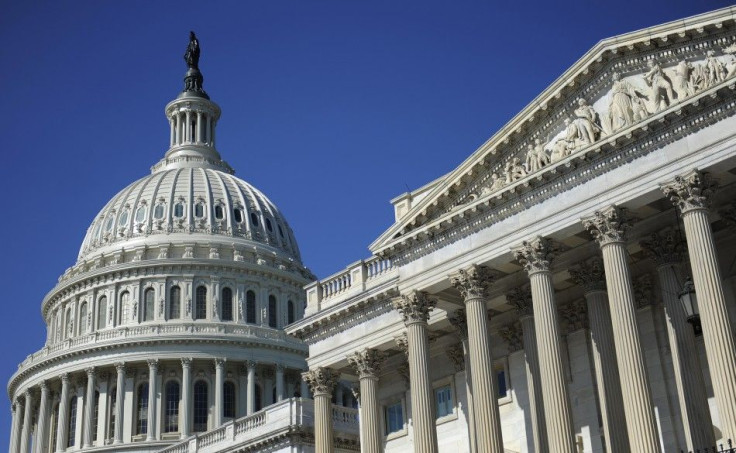Payroll Tax 'Deal Is Done' in Major Victory for Obama

(Reuters) - Negotiators Wednesday evening reached a sweeping tax cut deal that provides a victory to President Barack Obama and his fellow Democrats in Congress and frees Republicans of an issue that threatened to stalk them to the November elections.
The deal is done, a top Republican aide said after the main negotiators from both parties worked out their remaining differences. A senior Democratic aide said the top negotiators had finished their work.
The accord still awaits formal approval by a special bipartisan committee composed of members of the Senate and House of Representatives who could seek changes of their own before signing off on it.
Republicans badly wanted to bury the tax-cut issue that has left them divided and at risk of further angering voters, who already hold Congress in low regard, if they are seen as blocking renewal.
We're determined to put this to an end, first-term Rep. Renee Ellmers, R-N.C., told reporters. One of 20 negotiators on the payroll tax cut, she said Republicans want to move on to the real issues: the president's failed policies.
Provided the committee members sign off on it, the two chambers will aim to approve the deal by the end of the week, before lawmakers leave for a week-long recess.
House Speaker John Boehner, R-Ohio, and fellow Republican leaders cleared the way for a deal on Monday when they dropped their demand that there be spending cuts to pay for a reduction in the payroll tax in order to avoid an increase in the federal debt.
The decision showed Boehner's pragmatic side since his party would have been blamed for any failure to extend the tax cut, which many of his members initially opposed.
Since becoming speaker in January 2011, Boehner has had problems keeping some conservative members in line, particularly those who see deficit reduction as their chief mission.
A number of House Republicans criticized Boehner's decision on the tax cut, but others said it was needed to protect their constituents against a tax hike.
If Congress approves the tax-cut deal, it could be one of the few major bills that will become law before the November 6 elections when control of the House, Senate and White House will be up for grabs.
The agreement would extend the payroll tax cut, first implemented in 2011 at the request of Obama, until the end of this year for about 160 million U.S. workers.
Passage would end a battle that has raged since last year over legislation that some economists say is vital to keeping the U.S. recovery on track by injecting more consumer spending into the economy.
The payroll tax cut is estimated to put $1,000 in additional money in the hands of the average working family over one year. Extending long-term jobless benefits is seen by economists as one of the most effective ways of encouraging consumer spending as the unemployed use their benefit checks for basic needs.
Congressional Democrats seized the moment to bask in a victory they hope will boost Obama's November re-election chances just as an improving economy is helping his poll numbers.
Democratic aides described House Republican leaders' new willingness to let the payroll tax cut be extended and to do so without offsetting spending cuts by saying they had caved and folded.
Long known as the party of low taxes, Republicans initially fought the payroll tax cut that largely helped low- and middle-income workers, saying temporary tax cuts did little to stimulate the economy.
MAJOR TURNING POINT
Analysts said that opinion polls showing public disgust with a gridlocked Congress may have helped drive lawmakers, many of whom are up for re-election this year, toward a deal.
A lot of people in Washington, D.C., know that Congress is not enjoying such a great reputation and here's an opportunity to reach agreement to show that we can get our work done, said Sen. Max Baucus, D-Mont., one of the negotiators.
With economists disagreeing and Democrats simultaneously forcing Republicans to go on record in favor of tax cuts for the wealthy, Republicans found themselves in a losing situation.
As their leaders tried to move into winning territory, it only stoked Republican infighting as conservatives, including Tea Party movement activists, resisted handing Democrats a victory.
Greg Valliere of Potomac Research Group, a private and nonpartisan group that tracks Washington for investors, called the tax deal which also extends unemployment benefits a major turning point for the U.S. economy.
It greatly increases the odds that the economy will continue to expand, which should give a boost to Obama's reelection chances, Valliere told clients.
In addition, Valliere said, it drags House Republicans, who include many aligned with what has been seen as a rigid Tea Party movement, into the world of compromise.
As evidence, Rep. Joe Walsh, R-Ill., a Tea Party activist, has embraced the tentative deal, even though it would add about $100 billion to U.S. budget deficits - something that normally would be anathema to the Tea Party.
(Additional reporting by Donna Smith and David Lawder; Editing by Cynthia Osterman)
© Copyright Thomson Reuters 2024. All rights reserved.











